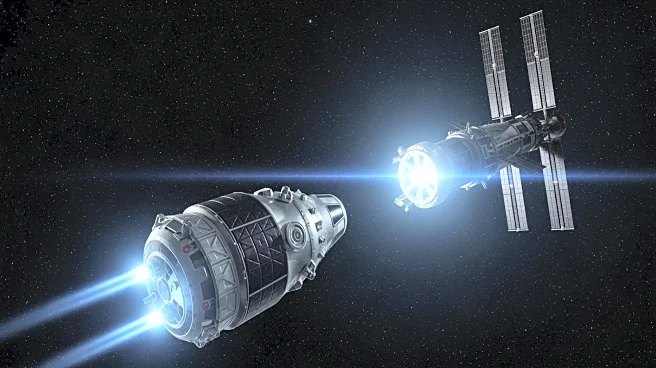What's Happening?
China has successfully launched its Shenzhou-21 mission, sending three astronauts to the Tiangong space station. The mission, which is the 16th crewed spaceflight for China's Shenzhou program, took off
from the Jiuquan Satellite Launch Center in the Gobi Desert. The astronauts, Zhang Lu, Zhang Hongzhang, and Wu Fei, are set for a six-month stay at the space station. The Tiangong space station, completed in October 2022, will host its 10th crewed flight. The spacecraft is expected to dock with the Tianhe core module approximately 3.5 hours after launch, utilizing a fast automated rendezvous and docking mode. The mission will focus on various scientific trials, including experiments with mice and spacewalks.
Why It's Important?
The Shenzhou-21 mission marks a significant step in China's growing capabilities in space exploration. By conducting scientific trials and experiments, China is advancing its research and technological development in space. This mission contributes to China's long-term goals of establishing a permanent presence in space and enhancing its aerospace industry. The successful launch and docking demonstrate China's technical prowess and commitment to expanding its influence in space exploration, potentially impacting international collaborations and competition in the space sector.
What's Next?
The astronauts will be greeted by the crew of the Shenzhou-20 mission, who are set to return to Earth soon. The Shenzhou-21 crew will conduct their planned scientific experiments and spacewalks during their six-month mission. As China continues to develop its space program, future missions may include more complex scientific endeavors and international collaborations. The outcomes of these experiments could influence future space missions and contribute to global scientific knowledge.
Beyond the Headlines
China's advancements in space exploration reflect broader geopolitical ambitions and technological progress. The successful launch of Shenzhou-21 underscores China's commitment to becoming a leading space power. This development may prompt other nations to accelerate their own space programs, potentially leading to increased international competition and collaboration in space exploration.










